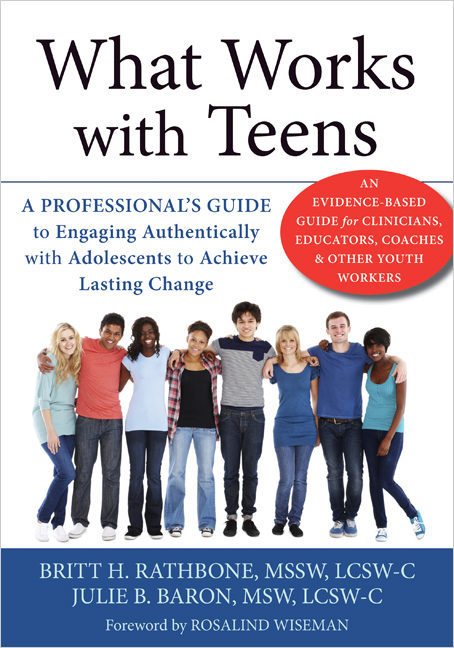By Britt H. Rathbone, MSSW, LCSW-C
Therapists often struggle when they meet a teenager who is reluctant or downright refuses to engage in treatment. The self-assuredness and biting sarcasm of an angry adolescent sometimes provokes an authoritative response in the therapist that leads to a disintegrating treatment relationship. So, how do you turn this around, build a connection, and get results?
The answer may seem counterintuitive: acknowledging and (gasp) even agreeing with the adolescent! What?! Agree? Yes! Imagine for a moment that you are required to do something you have not found helpful in the past, or you do not see the need for. How would you feel if you were forced you into it?
For many young people, there are good reasons to be cautious or even hostile when entering a treatment setting. They may have been mistreated in the past, experienced a less than professional level of service, or spent hours in ineffective treatment. Our best hope is to assume the adolescent’s resistance is actually an attempt to avoid something negative, and to side with this aspect of the protective behavior. This approach requires an ability to convey that we really “get it,” that we understand the adolescent’s behavior makes sense in a particular context, and we'll always give the adolescent the choice of what to do with the interaction. Jumping right in with a willingness to acknowledge that therapy sometimes isn’t useful or indicated paradoxically, weakens the resistance and allows the discussion to move to problem solving illustrated in the following examples:
Therapist: I get it, therapy has never helped in the past and you’re understandably pessimistic about it. What are other ways to get you closer to your goals?
or
Therapist: Let me back up; I think I jumped in too fast. You don’t like therapists and therefore you don’t like me. What could we do to get you out of this therapy as fast as possible?
The therapist then guides a discussion of solutions that may or may not include therapy. The skill is to stay balanced and speak to both sides of the ambivalence—while reinforcing efforts to change.
 Britt H. Rathbone, MSSW, LCSW-C, is an expert in adolescent mental health, and has worked exclusively with adolescents and their families since obtaining his degree from Columbia University in New York. He has worked in many settings, including urban programs for at-risk youth, nonprofit agencies, juvenile justice, and schools. Rathbone is currently the director of a private practice specializing in adolescent mental health issues. Rathbone teaches graduate students, speaks frequently on issues of adolescence to lay and professional audiences, trains therapists, and consults to schools. Rathbone is coauthor of Dialectical Behavior Therapy for At-Risk Adolescents, What Works with Teens, and the forthcoming Parenting a Teen Who Has Intense Emotions (December 2015).
Britt H. Rathbone, MSSW, LCSW-C, is an expert in adolescent mental health, and has worked exclusively with adolescents and their families since obtaining his degree from Columbia University in New York. He has worked in many settings, including urban programs for at-risk youth, nonprofit agencies, juvenile justice, and schools. Rathbone is currently the director of a private practice specializing in adolescent mental health issues. Rathbone teaches graduate students, speaks frequently on issues of adolescence to lay and professional audiences, trains therapists, and consults to schools. Rathbone is coauthor of Dialectical Behavior Therapy for At-Risk Adolescents, What Works with Teens, and the forthcoming Parenting a Teen Who Has Intense Emotions (December 2015).

 Part 2: What to Do When a Client Is Participating in Self-Judgment?
Part 2: What to Do When a Client Is Participating in Self-Judgment?